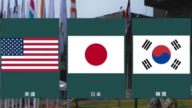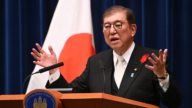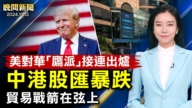【新唐人2014年02月11日訊】全球最權威的軍事媒體英國《簡氏防務》2月4號發表報告指出,目前位列世界第二位的中國防務預算,繼續保持高增長的勢頭,帶動了全球軍費開支增長。外界認為,中共軍備擴張,加劇了亞太地區的軍備競賽,同時也大大增加了戰爭風險。請看報導。
《簡氏防務》的報告說,2014年,全球軍費開支將比去年增加0.6%,達到15,470億美元,實現2009年來的首次年增長,中國是其中一個主要因素。
《簡氏》預測,2014年中國的防務預算,將從2013年的1392億美元,增加到1480億美元,到2015年,中國就會超過英國、法國和德國國防開支的總和。《簡氏》估計,到了2024年,中國軍費將比所有西歐國家都高。
目前,美國是世界上軍費開支最多的國家,2013年為5749億美元,但它比2012年的6643億美元減少了13%,預計美國未來幾年的軍費開支還會持續減少下去。
英國2013年的國防開支也比上一年減少了3.6%。
英國《每日電訊報》網站在2月3號報導說,歐洲軍事強國和美國,因財政緊縮而被迫大幅削減軍費的時候,亞洲和中東各國的支出卻急劇上升。
《每日電訊報》指出,亞洲軍費增加的一個原因,在於鄰國擔憂中國的軍事強勢,和中、日在「釣魚島」上的爭端,以及由此引發的口角等,讓鄰國感受到了威脅。去年中共宣佈在爭議的「釣魚島」附近建立防空識別區,加劇了緊張局勢。
「簡氏資訊集團」的資深分析師克雷格•卡弗裡說:「澳大利亞、印度和韓國都提高了軍費預算。」
卡弗裡認為,由於鄰國之間的互不信任情緒,防務支出上升的幅度和速度,會造成某種不穩定,而且在一定程度上,似乎刺激了這個地區其他地方增加軍費。
長期通過財政緊縮政策限制軍費預算的日本,也提高了2014年的軍費預算。
美國中文媒體《中國事務》主編 伍凡:「前兩天基辛格在慕尼黑全球安全會議上講話了,亞洲的局勢正類似於第一次世界戰爭的局勢,第一次世界戰爭前英國和德國交戰前的局勢。」
美國中文媒體《中國事務》主編伍凡指出,中國與日本在亞洲對恃的勢頭,正在向戰爭方向發展。
今年初,在達沃斯的世界經濟論壇(WEF)上,日本首相安倍晉三就把日本與中國的對抗,比作一戰前英國和德國的對抗。他說,當年這兩個歐洲強國之間廣泛的貿易往來,無法阻止兩國開戰,而如今,中國和日本也面臨「類似境況」。
美國海軍情報處高級情報官傑西•卡洛金(Jesse Karotkin),在1月30號美中經濟與安全審議委員會的國會聽證會上說,中國不斷提升軍力和強化伸張領土主權的力度,會帶動亞太地區的軍事競賽。
美國海軍軍事學院中國海事研究所創始人之一艾立信(Andrew Erickson )也在聽證會上說:中共的預算增長速度,大大超過西方國家和中國周邊的國家。
而卡洛金錶示,如果你是越南、菲律賓或馬來西亞,你會看到中共海軍驚人的發展速度。這種戰略競爭或安全困境,會影響這些地區國家的防務政策,會驅使這地區國家投入資源,以提升自己的軍事能力和反制力。
伍凡:「習近平上來,走的比胡溫走的還要快,比江澤民更快,因為他現在感覺到如果他不這樣走,他這個政權維持不下來。所以他上來就講強國、強軍,強軍來保護共產黨這個政權。」
伍凡指出,儘管中國在環境治理、公共醫療、教育等很多方面都缺錢,貧困人口也非常多,但中共卻在軍費上花很多錢。中共關注的是自己的專制統治,不會顧及老百姓的生活。
採訪/常春 編輯/宋風 後製/周天
China Drives Global Defense Spending Increase
On February 4, the world’s most authoritative British military
journal “Jane’s Defense" issued a report.
It said that China’s defense budget, the second largest in the
world, continues to maintain high growth momentum and
drives global defense spending increases.
It’s believed that China military expansion intensified the
arms race in the Asia-Pacific, greatly increasing the war risk.
Jane’s Defense said in 2014, global defense spending increased
by 0.6% compared with last year, reaching 1.547 trillion US$.
It achieved its first annual growth since 2009.
The report said China was a major cause.
Jane’s report predicts that China’s defense budget in 2014 will
increase from US$139.2 billion in 2013 to US$148 billion.
By 2015, it will exceed the total sum of the British, French
and German defense spending combined.
“Jane’s" estimated that China defense expenditure will be
higher than that of any Western European country by 2024.
Currently, the U.S. is the world’s highest military spending
country.
It was US$ 574.9 billion in 2013 and reduced by 13%
compared to US$664.3 billion in 2012.
The U.S. is expected to continually reduce military
spending in the coming years.
Britain Defense Spending decreased by 3.6% in 2013
than the previous year.
On February 3, the UK’s “Daily Telegraph" website reported,
when the military power in Europe and the United States cut
military spending due to fiscal austerity, the expenditure is
rising fast in Asia and the Middle East.
The Daily Telegraph pointed out that another reason for Asia’s
military spending increase is neighboring countries felt threats
from China’s military aggression, disputes on “Diaoyu Island"
between China and Japan, as well as the following quarrel.
Last year, tensions were inflamed when China imposed a
self-declared “Air Defence Identification Zone" (ADIZ)
over Diaoyu Islands
“Jane’s Information Group" a senior analyst Craig Caffrey said:
“Australia, India and South Korea have increased their budget."
Caffrey believed that because the mood of distrust between
neighbors, the magnitude and speed of the rise in defense
spending will cause some instability, and possibly stimulate
increase in region military spending elsewhere.
Japan also improved the 2014 military budget even as they
restricted military budget in the long-term by fiscal austerity.
US Chinese media “Chinese affairs" chief editor Wu Fan:
“Two days ago, Kissinger said in Munich Security Conference
that Asia is more in a position of 19th-century Europe, the
situation of pre-war Britain and Germany."
Wu Fan said that the opposite momentum between China
and Japan is to go to war.
Early this year, at the Davos World Economic Forum (WEF),
the Japanese Prime Minister Shinzo Abe compared current
tensions between Japan and China to rivalry between Britain
and Germany on the eve of the First World war.
He said that the extensive trade between the two European
powers cannot stop the war; China and Japan also face a
similar situation now.
Jess Karotkin, the US Senior Intelligence Officer (SIO) of
Office of Naval Intelligence wrote his testimony to the
US-China Economic and Security Review Commission.
In it he states that China repeatedly improved its military
capability and strengthened military efforts to assert its rule
over the territory, leading to an arms race in Asia-Pacific.
Andrew Erickson, co-founder, China Maritime Studies Institute,
US Naval War College, said Chinese military budget growth
rate far exceeds those of Western militaries and its neighbors.
Jesse Karotkin said that you will notice China navy’s massive
growth rate if you are in Vietnam, Philippines and Malaysia.
The strategic competition or security dilemma will affect
these regions’ defense policies.
It will push these regions to invest resources in order to
enhance their military capability and counter-force.
Wu fan: “Xi Jinping moves faster than Hu Jintao and
Wen Jiabao. He is even faster than Jiang Zemin.
Because if he doesn’t do so, the regime won’t last long.
Once he took office, he emphasized a strong nation and
strong military to protect the Chinese Communist Party."
Wu Fan points out that although China lacks funding
in environmental care, healthcare, and education aspects,
and still has a large population in poverty, it spends a lot of
money on military.
The Chinese Communist Party cares about its dictatorship,
it doesn’t care about civilians’ livelihoods.
InterviewChangChun Edit/SongFeng Post-Production/ZhouTian



























